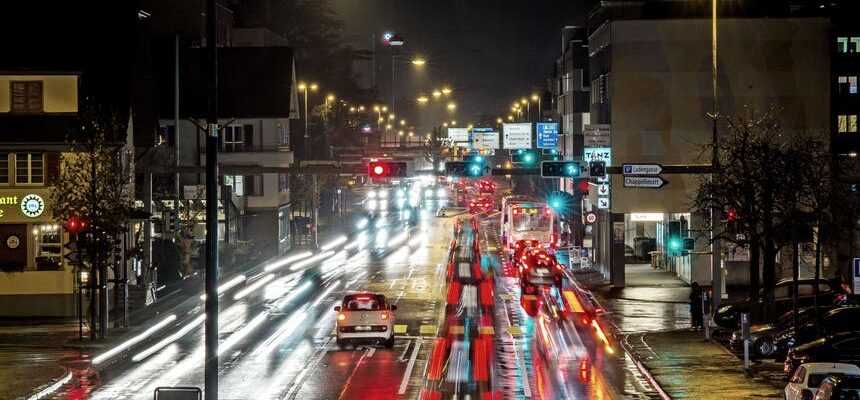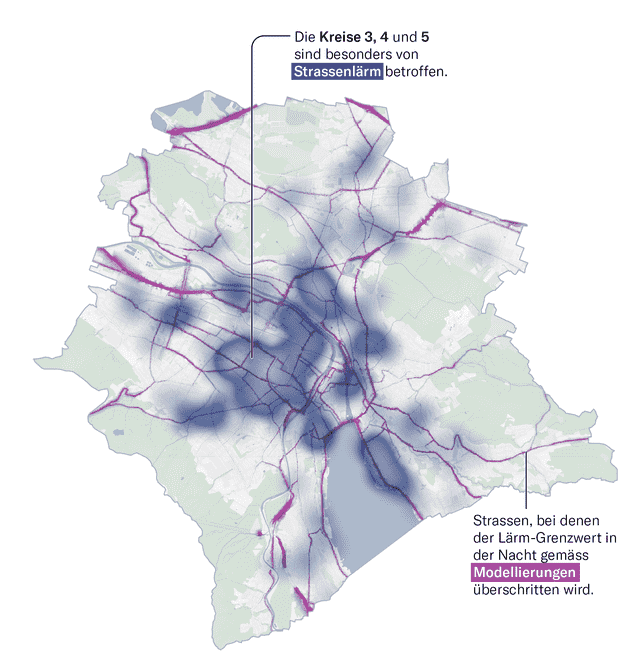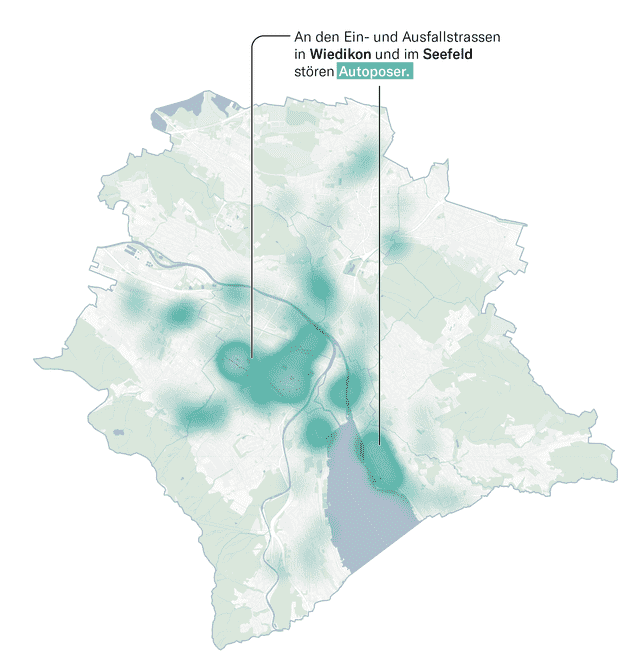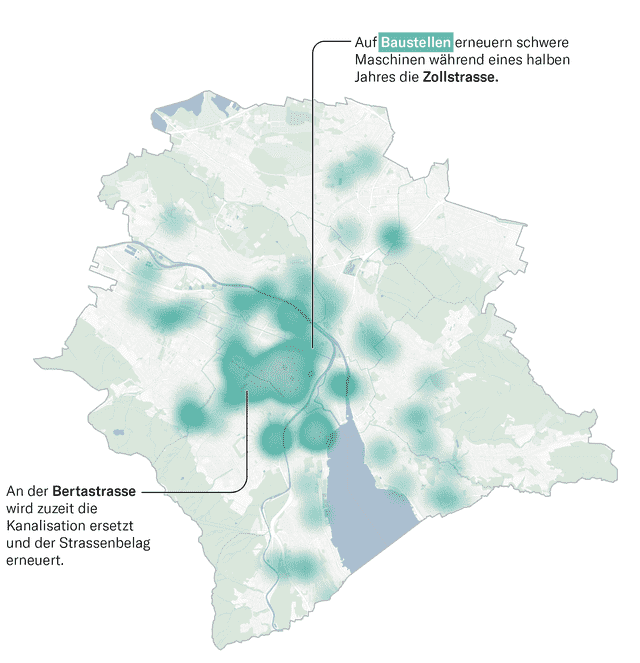Pius Amrein / LZ
Noise causes many conflicts in Zurich. This is shown by a survey of NZZ readers. These are the main sources of noise.
The neighbor’s stereo, the caretaker’s leaf blower. And only the traffic all day and the parties during the night! Wherever we listen in the city, it’s loud. Until someone “Silence!” calls, it often does not last long.
But what does that actually mean: “too loud”? To find out, we wanted to know from our readers what bothers them most about the city of Zurich and why. The answers show that almost any noise can be disturbing, from the bell in the school building to the squeaking of the tram to the cleaning van sweeping the streets early in the morning.
All in all, the sources of noise can be divided into four categories: street noise, party noise, construction sites and autoposers. But one after anonther.
If it’s constantly buzzing – street noise
«What are all the motorists doing in the city?! All for the sake of convenience.” – Response from the survey
According to measurements by the city of Zurich, in 2020 an average of 11,000 vehicles per day drove through Badenerstrasse in Wiedikon. So it’s no surprise that road noise is what bothers the survey participants the most. Districts 3, 4 and 5 are particularly affected. But also in Seefeld, many would like more peace and quiet.
The answers from the survey correspond to the model calculations of the Federal Office for the Environment. Using building models and traffic counts, the Federal Office calculates how loud a street is in theory. Our graphic shows those areas where the noise level limit is exceeded at night.
But in a national comparison, Zurich still fares quite well when it comes to traffic noise pollution. According to a 2021 study by the Zürcher Kantonalbank, cities in German-speaking Switzerland tend to be quieter than those in western Switzerland. According to the results, Zurich is in the middle, while Bern and Winterthur are quieter.
What to do against the constant noise from the street? In some streets, the permitted driving speed has been reduced, and so-called whisper-quiet surfaces are being used more and more frequently. Nevertheless, most of those plagued by road noise state that the situation has deteriorated in recent years.
Take the BMW for a walk – Autoposer
“The posers are absolutely devastating.” – Response from the survey
When the city carried out noise measurements on Hohlstrasse, the pointer on the measuring device regularly deflected during weekend nights. Every third trip between 10 p.m. and 2 a.m is said to have been that of an autoposer. The city measured up to 99 decibels. According to the city’s acousticians, it’s about as loud as if 80 vehicles drove by normally at the same time. In our survey, autoposers were the second most frequently cited annoyance.
Noise pollution from autoposers focuses on a few hotspots among those surveyed. The frustration about howling engines is particularly great in Seefeld and on Badenerstrasse, i.e. along the major access and arterial roads. In the city center, on the other hand, howling and rattling engines are less of a nuisance.
3. When the jackhammer thunders – construction sites
“You can hardly walk through the neighborhood without being plagued by the noise of construction sites.” – Response from the survey
Streets are like printers. Constantly broken. Accordingly, heavy machines often start up and irritate the sensitive ear. In the survey, construction noise ranks third among the most disturbing sources of noise. There are hardly any hotspots, after all, construction is going on all over the city. Only in the city center do construction sites seem to be piling up.
4. Hello party people! – exit noise
“This noise annoyance (e.g. in the form of ‘music’) is sometimes less easy to ignore than traffic noise, which penetrates the consciousness much less and can therefore simply be ignored.” –Response from the survey
When at night life really begins for some, others turn in bed angrily. In addition to traffic and car poses, the nocturnal noise of the conspecifics is a thorn in the ear. Two epicenters can be identified. They don’t surprise.
How loud is Zurich now?
«A city lives, pulsates and makes noise. A noise-free city is an illusion: creating one requires a pure bedroom community. Nobody here wants that!” – Response from the survey
Despite roaring engines and pounding beats from loudspeaker systems, the majority of those surveyed did not find Zurich to be a particularly loud city. In our survey, only 9 percent agreed with the statement “I think Zurich is a noisy city”. Just as many voted for the opposite. The remaining assessments are somewhere in the middle and result in an overall average of 3.06 on a scale of 1 to 5.
In addition to assessing given sources of noise, the respondents were also able to indicate their own sources of noise that bother them. These include reports of dogs barking too loud, noisy pizza delivery drivers or annoying church bells. Squeaking trams or roaring leaf blowers are also often mentioned.
Does Tempo 30 help now?
Compared to other cities, Zurich may not be particularly noisy. Nevertheless, many residents are disturbed by the high noise levels. Almost half of those surveyed are of the opinion that the city is not doing enough to reduce noise. A third, on the other hand, thinks that the measures are sufficient. But what exactly is she supposed to do? The answers are not clear.
Reduce speed to 30 kilometers per hour? Almost a third find this clearly an unsuitable means of reducing noise, while 35 percent consider 30 km/h to be very suitable for reducing noise.
Control the night’s rest more strictly? Again disagreement, 30 percent are clearly against, 31 percent are clearly in favor, most locate themselves somewhere in between.
Structural measures such as noise protection walls fared rather poorly. Half find this measure unsuitable; only a quarter thinks that this could reduce noise.
When it comes to autoposers, 57 percent of those surveyed call for the police to act tougher, while only a quarter of all participants in the survey are skeptical.
Moving away is not an option
Despite the noise, very few people want to move to quieter quarters or even to the countryside. A third of those surveyed stated that they had already thought about moving. But not more than half.
So noise remains an explosive topic, precisely because it is perceived very subjectively. And maybe because nobody likes to admit that he or she occasionally makes noise. Our respondents, for example, are convinced that they hardly cause any noise. 78 percent fully or somewhat agree with this statement. Only 9 percent admitted that they do not always walk on velvet paws.
olc./shu. The survey was posted on NZZ.ch for two weeks. A total of 1120 replies were received. 744 people completed the survey, 619 of them are residents of the city. The responses to their own place of residence were evaluated. The survey is not representative. Certain places known for their noise do not appear in this evaluation because no person interviewed lives there. However, the survey shows the mood within the NZZ readership.






